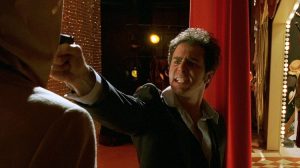Archer is currently one of the best shows on television. This is not an opinion, this is a fact. It’s witty, it’s funny, and, quite fortuitously, it is also a prime example of a genre parody.
First though, a brief introduction on what a genre parody is and how it works. A genre parody is, well, just that. It is a parody of a certain genre. More formally, for those that appreciate a more academic explanation, a parody “…is a work created to imitate, make fun of, or comment on an original work, its subject, author, style, or some other target, by means of satiric or ironic imitation.” (Wikipedia) It works when pastiche is “…engaged in reworking elements of the past…” (Sturken & Cartwright)
It functions by being ironic. On the one hand, it operates within the codes of the genre and obeys the rules and conventions, but at the same time, it very self consciously draws attention to to those codes and more specifically, the parody’s mockery of them.
Archer is a great example of a work that parodies a genre, specifically, the super over clichéd spy thriller genre. Other films also parody the genre, but in very subtle and subdued ways. Confessions of a Dangerous Mind comes to mind.

But Archer has no time for such subtleties. It makes no attempt to hide its parody of the genre and because of its format as a half hour comedy and as an adult animated series, the biting sarcasm works to its benefit. As a TV show, Archer is able to take itself less seriously than a film might, and as such, it can take bigger risks in how far it goes in pushing the envelope. The episode Honeypot in particular, is very obvious in parodying the genre it works in.

Sterling Archer himself is the perfect parody of a secret agent. In theory he checks every box: handsome, tall, dark hair, fit, alcoholic, attachment problems, serial womanizer, etc. However, the show is very self-conscious in the way that it manipulates those things. In a way, it works with them but in another way, it works against them as well. In this episode in particular, Archer is tasked to seduce a dangerous foreign agent but there’s a catch. That former agent is also a male, and Archer must pretend to be gay, which is a whole other conversation on its own. The setting of the show too is a statement. It is “intentionally ill-defined” says creator Adam Reed. The costumes and physical setting appear to be straight out of the ‘60s, the peak of spy culture, but the show makes some pop culture references that would seemingly place the show closer to the present.
The show still deals with the narratives present in most spy flicks, international treason, preservation of democracy, high stakes murders, it does so through a completely different lens. Rather than taking the issues seriously, it simply uses them as a rhetorical tool to poke fun at a genre which, at times, takes itself way too seriously.
If you’re still reading this, you should stop, put down everything, and binge watch 5 episodes of Archer.
